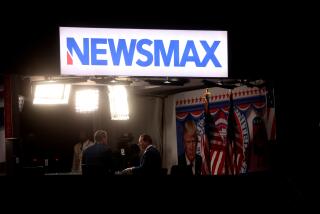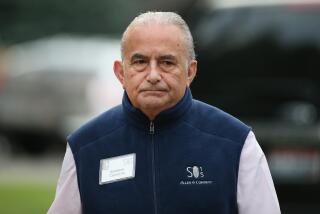Market Applauds Offering by Mexico’s Televisa : * Media: Years of losses did not faze the entertainment company’s spectacular debut on the Mexican stock exchange.
- Share via
MEXICO CITY — Mexico’s premier entertainment company made a spectacular stock market debut this week in the midst of a slump at the Mexican Stock Exchange.
In Mexico’s largest initial public offering, investors paid $750 million for 20% of Televisa, which owns 211 media-related businesses worldwide. At $12.50 a share, the sales price was $1 more than the top price expected.
The stock rose $1.17 in its first day of trading Tuesday, as the rest of the Mexican market plummeted. A simultaneous placement among U.S. institutional investors received a similarly enthusiastic reception. At the end of a tumultuous week on the Mexico City exchange, Televisa closed Friday at $13.19 a share.
But for most Mexicans, the big news was that the company--which has a virtual monopoly on private broadcasting here, owning four TV channels and six of the country’s radio stations--has lost money for the past seven years and has a negative net worth of $148 million.
With its control over advertisers and artists as well as the airwaves, Televisa has long been considered a money machine for its three owner families. But the offering’s prospectus revealed that Televisa lost $229 million the last three years.
Analysts and investors who bought the stock shrugged off the losses as a reflection of the operating style of a family company. That style, they say, has changed recently with a streamlining that included laying off 2,000 employees--120 of them relatives.
“It was a family company. Everyone was on the payroll,” said an investor who spoke on condition that his name not be used. “If you wanted to go shopping in Dallas, you took the company jet. If you wanted to start a newspaper, the company paid for it.”
Televisa owners were the investors behind the U.S. sports newspaper, the National, that folded last summer after losing an estimated $100 million--about half of which was charged to Televisa. (The company has a Century City-based U.S. subsidiary, Univisa, which distributes Televisa programming in the United States and operates an emerging Spanish-language TV network.)
“You ran up operating losses, so you paid no taxes,” the investor said. “If I ran a private company in Mexico, that is the way I would do it too.”
In fact, observers believe that Televisa’s tax record was the major reason behind government pressure to take the company public. The Treasury Ministry, its tax-collection policy growing more aggressive, reportedly gave Televisa officials until year’s end to list the company or face a tax audit.
Because of that time pressure, the company was unable to compile the data needed to offer shares to the public on a U.S. exchange, as it had announced it would do. Instead, the stock was sold to institutions under a provision of U.S. securities law that requires less disclosure. Investors expect the company to seek a listing next year.
Analysts at Baring Securities, co-lead underwriter on the international portion of the placement, noted that many of the losses were the result of aggressive accounting. For example, Televisa routinely wrote off 100% of its investment every year, analyst Timothy Heyman said.
Cash flow is a more accurate reflection of the company’s performance than profit, he said. Revenue is expected to reach $1 billion this year. Because the media company sells most of its advertising one to two years in advance, revenue predictions are unusually reliable.
Proceeds from the stock sale will be used to repay short-term debt, $450 million of which was taken on to buy out original shareholders earlier this year, according to the prospectus.
Still, even the most optimistic investors acknowledge that they are trusting a pledge by Televisa Chairman Emilio Azcarraga--whose family still owns 64% of the company--that he will change his operating style.
“One of the risks is that he is arrogant and pooh-poohs competition,” one investor said.
Azcarraga has personally assured major investors that he will allow revenue to flow to the bottom line.
More to Read
The biggest entertainment stories
Get our big stories about Hollywood, film, television, music, arts, culture and more right in your inbox as soon as they publish.
You may occasionally receive promotional content from the Los Angeles Times.










